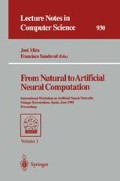Abstract
A statistical pattern recognition algorithm called learning transformed prototypes (LTP) is developed for probabilistic RAM (pRAM) neural networks. With LTP the pRAM net learns to map statistically the input sets to the output prototypes, or codebook vectors, in the binary domain. The method allows the pRAM net to self-organise the codebook vectors in the output space of arbitrary dimension. The similarities and differences of LTP with those algorithms such as LVQ (learning vector quantisation), SOFM (self-organised feature maps) and pRAM reinforcement learning are discussed. The training data processed in the method is the input-output spike series of the neural net, therefore the technique can be built into a hardware system with the currently available pRAM learning chips.
Preview
Unable to display preview. Download preview PDF.
References
Barto, A. G. & Anandan, P. (1985). Pattern recognising stochastic learning automata. IEEE Transactions on Syst. Man Cyb., 15, 360–374.
Clarkson, T. G., Gorse, D., Taylor, J. G. & Ng., C. K. (1992). Learning probabilistic RAM nets using VLSI structures. IEEE Transactions on Computers. 41, 1552–1561.
Clarkson, T. G., Guan, Y., Gorse, D. & Taylor, J. G. (1993). Generalisation in probabilistic RAM nets, IEEE Transactions on Neural Networks, 4, 360–364.
Gorse, D. & Taylor, J. G. (1989). An analysis of noisy RAM and neural nets. Physica D. 34, 90–114.
Gorse, D. & Taylor, J. G. (1991). Universal associative stochastic learning automata. Neural Network World, 1, 193–202.
Gray, R. M. (1984). Vector quantisation. IEEE ASSP Mag, 1, 4–29.
Guan, Y., Clarkson, T. G., Taylor, J. G. & Gorse, D. (1992). The use of encoded outputs and reinforcement training in pRAM nets. In I. Aleksander & J. G. Taylor (Eds.). Artificial neural networks, 2 (pp. 653–656), London: North Holland.
Guan, Y., Clarkson, T. G., Taylor, J. G. & Gorse, D. (1994). Noisy reinforcement training for pRAM nets. Neural Networks, Vol. 7, No. 3, pp. 523–538, 1994.
Kohonen, T. (1982). Self-organized formation of topologically corrected feature maps. Biological Cybernetics, 43, 59–69.
Kohonen, T. (1989). Self-organization and associative memory. Third ed. Berlin, Heidelberg: Spring-Verlag.
Kohonen, T. (1992). Learning vector quantisation and the self organising map. In J. G. Taylor & C. L. Mannion (Eds.). Theory and applications of neural networks, pp. 235–242.
Author information
Authors and Affiliations
Editor information
Rights and permissions
Copyright information
© 1995 Springer-Verlag Berlin Heidelberg
About this paper
Cite this paper
Guan, Y., Clarkson, T.G., Taylor, J.G. (1995). Learning transformed prototypes (LTP) — A statistical pattern classification technique of neural networks. In: Mira, J., Sandoval, F. (eds) From Natural to Artificial Neural Computation. IWANN 1995. Lecture Notes in Computer Science, vol 930. Springer, Berlin, Heidelberg. https://doi.org/10.1007/3-540-59497-3_207
Download citation
DOI: https://doi.org/10.1007/3-540-59497-3_207
Published:
Publisher Name: Springer, Berlin, Heidelberg
Print ISBN: 978-3-540-59497-0
Online ISBN: 978-3-540-49288-7
eBook Packages: Springer Book Archive

